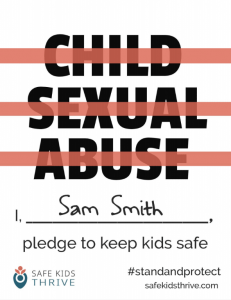Read the Report
Home / Read the Report
Home / Applying the Framework: A Five-Year Plan / Legislative Recommendations
Legislative Recommendations
It is the recommendation of this Task Force that legislation specific to the prevention of sexual abuse of children be pursued. While there are statutes specific to this purpose, there is need for deliberate refinement that will enable and equip those serving and working with children to help protect them from sexual abuse. Specifically, we recommend legislation in the following areas:
- The posting of abuse prevention information and actions in clearly visible and public locations in all public, and open-enrollment charter schools in the languages of those served.
- Examples would include the school’s Code of Conduct and step-by-step instructions explaining what students and staff should do if inappropriate behavior or abuse is experienced, suspected, observed or disclosed.
- The inclusion or incorporation of a personal safety and sexual abuse prevention curriculum in all primary, middle school, and high schools (Pre-K to Grade 12) as part of their health education frameworks.
- Curriculum should be evidence based and developmentally sequenced (age appropriate) and selected or adapted with appropriate consultation.
- Focus should be on recognizing, responding to, and reporting boundary violating and other sexually offending behaviors to a trusted adult.
- The development and implementation of an online training program for the prevention, identification and reporting of child abuse, child sexual abuse, and the commercial sexual exploitation of children (CSEC) for all mandated reporters.
- Training should be administered annually and augmented with information specific to the role and profession of the learner.
- The training system should administer an examination to test content understanding and, upon successfully passing the examination, issue a certificate of completion.
- Completion of mandated reporter training should be a prerequisite for renewal of licensure.
- The creation of a senior multidisciplinary team (MDT), focused on the review of any Massachusetts child abuse case where the child(ren) or family has/have experienced repeated entry into the care of the Department of Children and Families within any 12-month period.
- The MDT should be chaired by the Office of the Child Advocate (OCA) and include DCF, the Children’s Trust, senior social workers and others the OCA determines as necessary.
- Strengthening collaborations between public and private child and youth serving agencies to expand in-home visiting and parent coaching programs for families with children from conception to age 5.
- This type of programming is prevention-oriented and has been shown to reduce child maltreatment numbers while increasing the numbers of parents who have knowledge of positive parenting and child development.
- Collaborations should be oriented toward expanding the evidence base by producing annual reports that evaluate the outcomes of these interventions and use them to develop the standards and regulations necessary for implementing high quality, effective in-home, parent coaching and home visiting programs.
- Every youth serving organization in Massachusetts (non-profit and for-profit) should ensure that they have a set of policies and procedures that are in accord with the contents of this Report.
- Policies should include ongoing training and education for administrators, supervisors and managers, staff, employees, contractors and volunteers; screening of prospective employees and volunteers; codes of conduct that identify appropriate and boundary-violating behaviors; monitoring, measurement and feedback to all staff; and assessment and modification of physical spaces and facilities to reduce opportunities for sexual abuse
- YSOs should make the information about their abuse prevention programs available to parents, guardians and other interested persons in the community.
- Before hiring, all schools and YSOs should obtain written permission and authorization for disclosure (along with records release, and a release from liability) by the applicant’s current and former employers.
- The disclosure should include inquiries about whether the applicant was the subject of any abuse or sexual misconduct investigation; has ever had a license revoked or suspended while (or after) being investigated for sexual misconduct; or was ever disciplined, discharged or non-renewed, asked to resign; or was otherwise separated from employment while (or after) allegations of sexual misconduct were being investigated.
- Acknowledgements
- Executive Summary
- Introduction
- How to Read This Report
- Mission & Purpose of Taskforce
- A Brief History of How the Taskforce Was Organized
- The Charge of the Legislative Language
- Key Sections
- Section 1: Developing Policies and Procedures for Child Protection
- Section 2: Screening and Background Checks for Selecting Employees and Volunteers
- Section 3: Code of Conduct and Monitoring
- Section 4: Ensuring Safe Physical Environments and Safe Technology
- Section 5: Recognizing, Responding to, and Reporting Allegations and Suspicions of Child Sexual Abuse
- Section 6: Training About Child Sexual Abuse Prevention
- Additional Considerations
- Applying the Framework: A Five-Year Plan
- Appendices
- Section-Specific Appendices
- Downloadable Resources

Take the Pledge to Keep Kids Safe
Join us and commit to learning how you can protect the children you serve.
Sign Up to Access Your Learning Center
Customized child sexual abuse prevention guidelines to meet the unique needs of any organization that serves children.
- Evidence-informed guidance
- Actionable prevention steps
- Keeps track of your progress
- Tailored learning tracks


